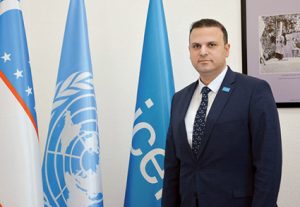
 Munir Mamedzade: The Multiple Indicator Cluster Survey (MICS) means that data on many important indicators for children and women are collected through a representative household survey. Households selected for the MICS survey will reflect specific population groups in the country (women, children, population by region, and those living in rural and urban areas). The population is interviewed using 4 questionnaires: a household questionnaire, an individual questionnaire for women aged 15-49, a questionnaire for children under five, a questionnaire for children at the age of 5-17. The vaccination data collection form will be used to collect information from the medical offices on vaccinations for children under three years of age. To ensure quality, objectivity, reliability and real-time data collection, the survey will be conducted using tablets.
Munir Mamedzade: The Multiple Indicator Cluster Survey (MICS) means that data on many important indicators for children and women are collected through a representative household survey. Households selected for the MICS survey will reflect specific population groups in the country (women, children, population by region, and those living in rural and urban areas). The population is interviewed using 4 questionnaires: a household questionnaire, an individual questionnaire for women aged 15-49, a questionnaire for children under five, a questionnaire for children at the age of 5-17. The vaccination data collection form will be used to collect information from the medical offices on vaccinations for children under three years of age. To ensure quality, objectivity, reliability and real-time data collection, the survey will be conducted using tablets.
– Currently, Uzbekistan is carrying out several types of household surveys, which provide mainly socio-economic information about the population. What are the advantages of this survey compared to other surveys?
Bakhodir Begalov: MICS is specifically designed to collect information about women and children who traditionally belong to the most vulnerable groups in the population. Since government policy is aimed at supporting those most in need, it is obvious that it is necessary to identify these vulnerable groups and their problems. The availability of data on children, youth and women will enable the government to develop targeted programs to meet the needs of these populations.
– Financial and technical support for the study was provided by the United Nations Children’s Fund (UNICEF). Why is MICS an important and valuable source of information for UNICEF’s work?
Munir Mamedzade: It is impossible to overestimate the power of data at the household level required for monitoring progress and decision-making based on facts. UNICEF believes in the need to go beyond collecting data and using it to inform innovative policies and programs that will enable governments to achieve better results for women and children. MICS will no doubt provide updated socio-economic indicators for evidence-based policy development for children, for monitoring the Sustainable Development Goals (SDGs) in Uzbekistan, child rights and national priorities.
The decade from 2020 to 2030 has been declared by the United Nations a «Decade of Action». This MICS survey is taking place at a time when we are taking action and truly embarking on a road to achieving accelerated results for the sustainable development goals. Therefore, now is the most opportune moment to collect data and, perhaps, draw special attention to areas that require acceleration in development.
Uzbekistan performed well on several indicators of social development, and the MICS survey can demonstrate this clearly. In addition, as in any country, there are development gaps that need to be identified and closed. In this context, the purpose and nature of household surveys such as the MICS is also critical to measuring poverty and inequality, and of course, for UNICEF, this data is extremely important, as it helps to support the successful development of the country, as well as to monitor so that no one is left behind.
– What important areas is information also collected within the framework by MICS?
Bakhodir BEGALOV,
Chairman of the State Committee of the Republic of Uzbekistan on Statistics
Fikr bildirish